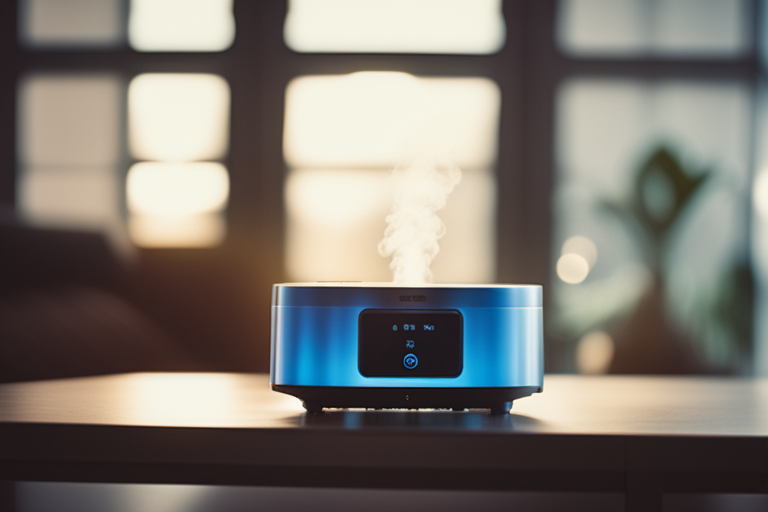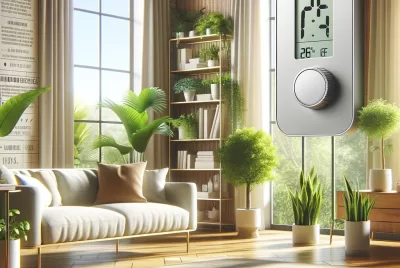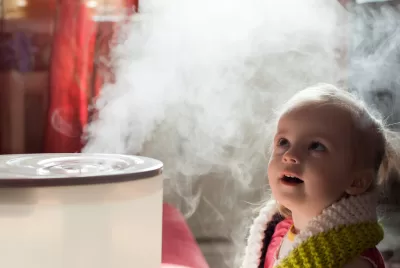The Ultimate Guide to Humidifier Benefits: Better Sleep and More!
"We may earn a commission for purchases made using our links. Please see our disclosure to learn more."
Are you curious about the benefits of using a humidifier? If so, you’re in the right place! Humidifiers are devices that can improve your health and overall comfort by adding moisture to the air. In this ultimate guide, we’ll explore the many benefits of using humidifiers, including improved respiratory health, better sleep, improved comfort, and more. We’ll also discuss potential risks and provide tips on how to choose the right humidifier for your needs.
A. Explanation of what humidifiers are
Humidifiers are devices that add moisture to the air in your home or office. They come in various shapes and sizes, from small tabletop models to larger, whole-house units.
B. Importance of using humidifiers
Dry indoor air can cause a host of problems, from dry skin and nasal passages to respiratory issues and more. Humidifiers help to alleviate these problems by increasing the moisture levels in the air, making it more comfortable to breathe.
C. Explanation of the benefits of using humidifiers
Using a humidifier can have numerous benefits, including improved respiratory health, better sleep, improved comfort, and more. Let’s dive into these benefits in more detail.
Humidifier Benefits
This article covers the benefits of using humidifiers in homes.
– Humidifiers can alleviate respiratory conditions, relieve dry skin, nosebleeds, and sore throats, and prevent the spread of viruses and bacteria.
– They can also improve sleep quality, reduce energy bills, preserve furniture, and make you feel warmer at a lower temperature.

Health Benefits of Humidifiers
A. Alleviates respiratory conditions
Dry air can cause a variety of respiratory issues, including coughing, wheezing, and congestion. Using a humidifier can help to alleviate these symptoms by adding moisture to the air, making it easier to breathe. In addition, humidifiers can help to reduce the risk of infections by keeping the mucous membranes in the nose and throat moist, making it more difficult for viruses and bacteria to penetrate and cause illness.
B. Relieves dry skin, nosebleeds, and sore throats
Dry indoor air can cause dry, itchy skin, nosebleeds, and sore throats. A humidifier can help to alleviate these symptoms by adding moisture to the air, keeping the skin and nasal passages moist and reducing irritation.
C. Prevents the spread of viruses and bacteria
Dry indoor air can contribute to the spread of viruses and bacteria, as it can dry out the mucous membranes in the nose and throat, making it easier for germs to enter the body. Using a humidifier can help to reduce the spread of these germs by keeping the mucous membranes moist and healthy.
D. Personal anecdote
Personally, I have noticed a significant improvement in my respiratory health since using a humidifier. I no longer wake up with a dry throat or stuffy nose, and I am less prone to respiratory infections.
Improved Sleep
A. The impact of dry air on sleep quality
Dry air can have a negative impact on sleep quality, leading to nasal and throat irritation, snoring, and sleep apnea. This can result in poor sleep quality, leaving you feeling tired and groggy in the morning.
B. How humidifiers can prevent nasal and throat irritation, snoring, and sleep apnea
Using a humidifier at night can help to prevent nasal and throat irritation, snoring, and sleep apnea by adding moisture to the air. This can help to keep the nasal passages and throat moist, reducing irritation and inflammation and improving airflow.
C. Best practices for using humidifiers at night
When using a humidifier at night, it’s best to keep it at a safe distance from your bed to avoid getting too much moisture on your bedding or pillows. In addition, it’s important to use distilled water in your humidifier to prevent the growth of bacteria and mold.
D. Personal anecdote
Since using a humidifier at night, I have noticed a significant improvement in my sleep quality. I no longer wake up with a dry throat or nasal congestion, and I feel more rested in the morning.

Improved Comfort and Energy Savings
A. How humidifiers make you feel warmer at a lower temperature
Humidifiers can help to make you feel warmer at a lower temperature by adding moisture to the air. This can help to reduce the amount of heat you need to feel comfortable, leading to energy savings and a lower heating bill.
B. Best practices for using humidifiers to reduce energy bills
To reduce your energy bills, it’s important to use your humidifier strategically. For example, you can use your humidifier in the rooms where you spend the most time, such as your bedroom or living room. You can also use it in conjunction with your heating system to reduce the amount of heat you need to feel comfortable.
C. How humidifiers can improve comfort in dry climates
If you live in a dry climate, using a humidifier can help to improve your overall comfort level. By adding moisture to the air, a humidifier can help to alleviate dry skin, nosebleeds, and other common issues associated with dry air.
D. Personal anecdote
Living in a dry climate, I have found that using a humidifier has made a significant difference in my comfort level. My skin is less dry, and I no longer experience nosebleeds or throat irritation.

Furniture Preservation
A. The impact of dry air on wooden furniture
Dry indoor air can have a negative impact on wooden furniture, causing it to crack and warp over time. This can be especially problematic in the winter months when indoor air tends to be drier.
B. How humidifiers can maintain the integrity of furniture and other household items
Using a humidifier can help to maintain the integrity of your wooden furniture and other household items by adding moisture to the air. This can help to prevent cracks and warping, keeping your furniture looking like new for longer.
C. Best practices for using humidifiers to preserve furniture
When using a humidifier to preserve furniture, it’s important to maintain a consistent humidity level in your home. This can be achieved by using a hygrometer to monitor the humidity levels and adjusting your humidifier accordingly.

Types of Humidifiers
A. Cool mist humidifiers
Cool mist humidifiers use a fan to blow air over a wick or filter that has been saturated with water, creating a fine mist that is released into the air. This type of humidifier is typically the most affordable and energy-efficient option.
B. Warm mist humidifiers
Warm mist humidifiers heat water to create steam, which is released into the air. This type of humidifier is often recommended for those with respiratory issues, as the warm mist can help to soothe irritated nasal passages and throats.
C. Ultrasonic humidifiers
Ultrasonic humidifiers use ultrasonic vibrations to create a fine mist that is released into the air. This type of humidifier is typically the quietest option, making it ideal for use in bedrooms or other quiet spaces.
D. Evaporative humidifiers
Evaporative humidifiers use a fan to blow air over a wet wick or filter, creating a fine mist that is released into the air. This type of humidifier is typically the most affordable option, but it can be noisy and may require frequent filter replacements.
E. How to choose the right humidifier
When choosing a humidifier, it’s important to consider your specific needs and preferences, such as the size of the room or the specific health concerns being addressed. Research each type of humidifier before making a purchase to ensure that you choose the one that’s right for you.
| Types of Humidifiers | Pros | Cons |
|---|---|---|
| Cool Mist Humidifiers | Most affordable and energy-efficient option | Not suitable for use in cold climates |
| Warm Mist Humidifiers | Ideal for those with respiratory issues | Uses more energy and can be more expensive |
| Ultrasonic Humidifiers | Quiet operation and produces a fine mist | Can create white dust if not used with distilled water |
| Evaporative Humidifiers | Most affordable option | Can be noisy and require frequent filter replacements |
Potential Risks
A. Over-humidification
Over-humidification can occur when a humidifier is used excessively or in a room that is too small. This can lead to the growth of mold or bacteria and can exacerbate respiratory issues.
B. Risk of mold growth
Mold can grow in humidifiers that are not cleaned and maintained properly. This can lead to respiratory issues and other health problems.
C. Best practices for avoiding potential risks
To avoid the potential risks of using a humidifier, it’s important to follow the manufacturer’s instructions carefully and to clean and maintain your humidifier regularly.
Maintenance
A. Importance of regular maintenance
Regular maintenance is essential for keeping your humidifier in good working condition and preventing the growth of bacteria and mold.
B. Best practices for cleaning and maintaining humidifiers
To clean and maintain your humidifier, it’s important to follow the manufacturer’s instructions carefully. This may involve rinsing the humidifier daily, cleaning it weekly, and replacing the filter or wick as needed.
C. How to prevent bacteria and mold growth in humidifiers
To prevent bacteria and mold growth in your humidifier, it’s important to use distilled water and to clean and dry your humidifier thoroughly after each use. You can also use a bacteriostatic treatment to inhibit the growth of bacteria and mold.
Personal Story: My Experience with Improved Sleep
I used to struggle with getting a good night’s sleep due to dry air in my bedroom. I would wake up with a dry throat and irritated sinuses. I tried a variety of remedies, but nothing seemed to work until I purchased a humidifier. Since using the humidifier, I have noticed a significant improvement in my sleep quality. I no longer wake up with a dry throat or sinuses, and I feel more rested in the morning.
I also noticed that my partner’s snoring has decreased since we started using the humidifier. The added moisture in the air has prevented his nasal passages from becoming dry and irritated, reducing his snoring.
One tip I found useful is to use a humidifier with a timer function, which turns off the machine after a set amount of time. This ensures that the air doesn’t become too humid and reduces the risk of mold growth. Overall, using a humidifier has greatly improved my sleep quality and I highly recommend it to anyone struggling with dry air in their home.
Conclusion
A. Recap of the benefits of using humidifiers
Using a humidifier can have numerous benefits, including improved respiratory health, better sleep, improved comfort, and more.
B. Tips for choosing and using humidifiers
When choosing a humidifier, it’s important to consider your specific needs and preferences, as well as the features and benefits of each type of humidifier. It’s also important to use your humidifier strategically and to follow the manufacturer’s instructions carefully.
C. Final thoughts on the importance of humidifiers for improving your health and home.
Overall, humidifiers are an essential tool for improving your health and home. By adding moisture to the air, humidifiers can help to alleviate a variety of health issues and improve your overall comfort level. However, it’s important to use them properly and to maintain them regularly to avoid potential risks. If you’re considering using a humidifier, do your research and choose the one that’s right for you.
FAQs
Who can benefit from using a humidifier?
Anyone who lives in a dry climate or suffers from allergies.
What are the benefits of using a humidifier?
It can improve indoor air quality, reduce dry skin, and alleviate respiratory issues.
How does a humidifier work?
It adds moisture to the air, increasing humidity levels in your home.
What if I don’t want my home to feel too humid?
You can adjust the humidity levels on most humidifiers to your desired comfort level.
How often should I clean my humidifier?
It’s recommended to clean it every week to prevent bacteria buildup.
What type of humidifier should I buy?
It depends on your needs, but a cool mist humidifier is typically the safest and most energy-efficient option.




